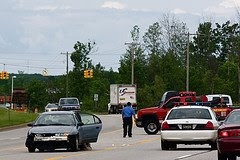
Police expect challenges to roadside drug test law
DOUG MACKENZIE
Source-The Cape Breton Post
SYDNEY — Drivers who operate a motor vehicle while high will no longer be able to refuse road side drug tests under new laws which came into affect last week.
Police can now require drivers to submit to roadside tests and also have the power to take suspected drug-impaired drivers to a police station or hospital to get a blood, urine or saliva sample. Under the old law, police were obliged to tell drivers suspected of being high that roadside tests weren’t mandatory.
While the new law is being heralded by law enforcement officials, they also realize there will be challenges involved with enforcement.
“To us, this is a great thing, it’s another tool in our toolbox in terms of our officers out on the streets dealing with people they believe are drug induced and driving and now we actually have the law in place which gives us the authority to deal with these issues,” said deputy chief Myles Burke, of the Cape Breton Regional Police. “I think this is a great thing for law enforcement and a great thing for the community – it’s a positive step. There will no doubt ... be challenges to the law, challenges to the constitutionality of the demand and even the expertise of the experts themselves …
“This stuff can be challenged, but that’s fine. That comes with every law we’re dealing with, but at the end of the day we will have people here who are certified experts, who will be doing the field testing that is required and will be going to court in cases where they feel someone is driving under the influence of narcotics.”
Burke said training of officers within the traffic safety unit will be the key to successful enforcement of the law and he would like to see experts on call 24/7 to help deal with situations when they arise.
“The training is very specialized and although there are funds available to train officers, it does require a significant commitment and officers have to leave the local area (for training),” said Burke. “One component of the course, the officers are actually trained at a U.S. prison doing testing of people going in and out of the prison. Their field subject testing is actually live at a prison.
“We have requested for the next training course available to have a couple of seats made available. We are very interested in having a couple of our officers trained as experts.”



No comments:
Post a Comment